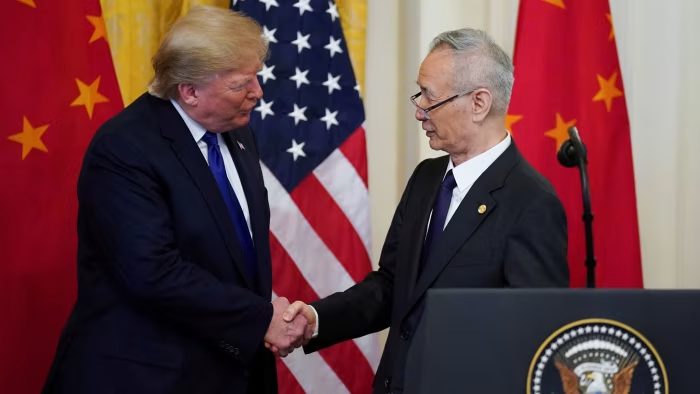Trump’s Tariff Gamble Backfires as China Deal Hands Beijing the Upper Hand: 5 Painful Takeaways
Another day, another trade war plot twist—only this time, the punchline lands squarely on Washington. Fresh off a renegotiated deal with China, Trump’s tariff playbook just delivered Beijing an unforced victory. Here’s how the math backfired.
1.
The Bluff Got Called
: China’s export machine didn’t just absorb tariffs—it rerouted supply chains through Vietnam and Mexico. Classic regulatory arbitrage.
2.
Tech Transfer Boomerang
: Forced partnerships? Joke’s on us. Chinese firms now lead in 5G and EVs—while U.S. factories scramble for subsidies.
3.
Agri-Business Collateral Damage
: Soybean farmers got crumbs from bailouts after losing their top buyer. Meanwhile, China locked in cheaper Brazilian imports.
4.
Inflation as Policy
: Those 10% price hikes on Walmart shelves? Turns out tariffs are just taxes with extra steps—and worse PR.
5.
The Dollar’s Slow Bleed
: Every tariff accelerated yuan-denominated oil deals. Gold reserves? Up. Bitcoin adoption? Don’t look now.
Lesson learned: In global trade, hardball works—until the other side starts playing 4D chess with your rulebook. (And yes, Wall Street still thinks next quarter’s guidance will magically fix it all.)
Key Losses for the U.S. in the Latest US-China Trade Deal and Market Reactions

US-China’s trade deal key losses became evident after many months of escalating tensions. While TRUMP claimed the deal represented progress in America’s “decoupling” from China, the available evidence suggests that Beijing may have actually secured the upper hand in these negotiations. Chinese officials and state-run media were quite quick to frame the agreement as a vindication of their strategy.
China’s Strategic Victory
A social media account linked to China’s national broadcaster CCTV stated:
Foreign Minister Wang Yi had previously said in March 2025:
Global Perception Shifts
The timing of this deal coincides with a dramatic shift in international perceptions. According to the latest Democracy Perception Index, more countries now view China favorably than the United States for the first time in the survey’s history. America’s rating dropped from +22% to -5%, while China’s stands at +14%.
Anders Fogh Rasmussen, Chair of the Alliance of Democracies Foundation and former NATO Chief, commented:
Economic Implications for American Consumers

US-China’s trade deal key losses also extend to American consumers in ways that might not be immediately obvious. Economic experts are warning that prices may still rise despite the reduction.
Rick Muskat, president of shoe retailer Deer Stags, was clear about the fact that:
New Baseline Tariffs Set Concerning Precedent
According to Deborah Elms, director of the Trade Policy Project at the Hinrich Foundation, albeit dismantling the most punitive tariffs, the rollback leaves a new 10% starting point for US imports, far above the 2% average that took effect in early 2024. Such alteration, which may appear insignificant at first sight, may have long-term implications for the American trade policy.
Temporary Relief Amid Lingering Uncertainty
Stuart Rumble, Head of Investment Directing at Fidelity International, described the agreement as a:
The 90-days agreement is a considerable de-escalation but the key losses of the US-China trade deal imply that this is rather a strategic retreat than a victory. The Trump trade war fallout continues to be calculated not only in terms of economics but in global clout where China seems to be gaining at America’s expense. And, well, the trade war consequences of Trump have also restructured world trade dynamics, probably setting disturbing precedents for negotiations with another partner in the future. Besides, the Ripple from Trump’s trade war impact may be felt across the world in the markets for months and years to come.

